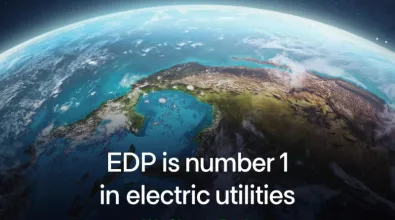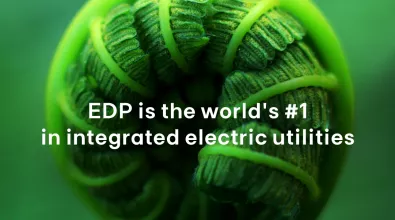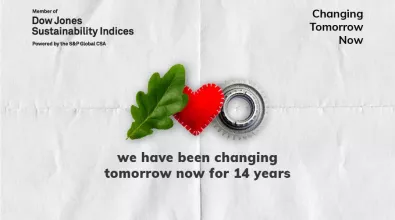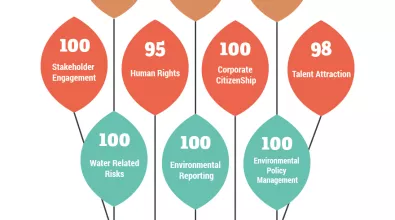ESG Ratings
As consumer demand for clean energy grows, demonstrating sustainability fosters customer loyalty and strengthens our green focused positioning.
Presenting sustainable performance is vital for regulatory compliance, attracting green investments, and building a positive reputation. It aligns the company with environmental laws and helps secure financing from ESG-focused investors.
ESG Ratings are assessments given to companies or financial instruments based on their adherence to ESG criteria. The current major challenge faced by companies is the quality and comparability of these ratings. ESG ratings have gained increasing influence in global capital markets, as investors, borrowers, and issuers rely on them to make well-informed, sustainable investment and financing decisions.
ESG ratings are used as inputs for EUR 3,787 billion (i.e 48% of total assets under management), according to ESMA ESMA Call for evidence on market characteristics of ESG Rating, June 2022.
The Proposal for a regulation of the European Parliament and the Council on the transparency and integrity of Environmental, Social and Governance (ESG) rating activities aims to enhance the reliability and comparability of ESG ratings by introducing a common regulatory approach to improve the transparency and integrity of ESG ratings providers' operations and prevent potential conflicts of interest.
Some aspects of the new ESG rating regulation: a) Under the new regulation European Securities and Markets Authority (ESMA) will be responsible for developing the secondary legislation/ Regulatory Technical Standards (RTS) which will further clarify the responsibilities of authorised ESG Ratings providers under the new regime; b) Providers must publish on their website the methodologies, models and key rating assumptions they use in their ESG rating activities.
ESG scores are an essential tool for EDP, facilitating the measurement of the company’s ESG risk, ESG performance and long-term ESG value creation, contributing to the continuous improvement of its operations, and fostering trust and confidence among investors and other stakeholders. We follow the ESG rating providers which allow us to disclose the ESG ratings/scores on the table below.
Results of the sustainability assessment (1)
| ESG Rating Providers | Scale | Score | Ranking | Publication of results |
|---|---|---|---|---|
| S&P Global Corporate Sustainability Assessment | 0-100 | 86 | 2nd position in electric utilities | November 2024 |
| CDP Climate Change | "D-" to "A" | A List | Top 2% | February 2025 |
| Sustainalytics | 100-0 | 20.7 (medium risk) | n.a. | March 2025 |
| MSCI (M SCI ESG) | CCC - AAA | AAA | Top 11% | November 2024 |
| ISS ESG Ratings (QS - Quality Score) | 10-1 | E&S:1 | G:2 | n.a. | September 2024 | July 2024 |
(1) The ratings are independent and, as such, there should be no comparison.
n.a. - not applicable.
In the last few years, several ESG rating providers have published ESG ratings on their websites without any paywall. S&P Global, MSCI, Sustainalytics and CDP are some examples of those practices.
Peer ESG rating overview
| ESG Ratings | EDP | Terna | Iberdrola | Enel | Örsted |
|---|---|---|---|---|---|
| S&P Global | 86 | 83 | 85 | 83 | 58 |
| MSCI | AAA | AA | AAA | AAA | AAA |
| MSCI Temperature Rise | 1.3ºC | 1.4ºC | 1.3ºC | 1.3ºC | 1.4ºC |
| Sustainalytics | 18.2 | 7.9 | 16.3 | 18.8 | 15.6 |
| CDP Climate Change The A List | A | - | A | A- | A |
Check also the information for non-ESG rating agencies
This journey began in 2003 when the company embraced the concept of the triple bottom line — environment, society, and economy — as the pillars of sustainable development. EDP’s Board of Directors declared that year as the “year zero” of its sustainability commitment. Since then, the company has defined strategies that have driven its transition to a more sustainable business model, recognised by several ESG rating providers such as S&P. EDP continues to be seen as a company with strong capacity to adapt to ESG challenges, focused on innovation, quality, and long-term value creation.
In 2024, EDP maintained its position as one of the world’s leading electric utilities in sustainability, being included in the Dow Jones Best-in-Class Index for the 17th consecutive year, and remaining the only Portuguese company in the global index since 2006. EDP was also ranked among the Top 5% in the S&P Global Sustainability Yearbook 2025, standing out among 264 utilities from various regions. This recognition reflects EDP’s consistent leadership over the past 17 years.
In the most recent assessment, EDP was distinguished as “Best in Class”, achieving 100 points in five out of 23 criteria: Transparency & Reporting, Business Ethics, Human Rights, Customer Relations, and Market Opportunities — one more than the previous year. The company’s Integrated Annual Report was also recognised by the World Business Council for Sustainable Development as one of the world’s top ten reports, for the third consecutive year.
EDP also improved its performance in criteria such as waste and pollutants, water, and risk and crisis management. The company has already achieved an 88% reduction in water usage, surpassing its 2025 target of 78%. Circular economy practices and digitalisation have supported a continuous reduction in waste over the past four years.
Today, around 95% of all energy produced by EDP comes from renewable sources, a dramatic shift from 2005, when 80% of electricity generation came from fossil fuels. EDP remains committed to achieving carbon neutrality by 2040 and to sustainable financing, having already surpassed its In 2024, around 95% of the energy generated by EDP came from renewable sources, compared to just 20% in 2005. The company strengthened its commitment to carbon neutrality by 2040 and to sustainable financing, having already exceeded its 2026 green funding target of 60%. EDP’s continued presence in the Dow Jones Indices and the S&P Sustainability Yearbook reflected its consistent dedication to the energy transition, technological innovation, and the fight against climate change.
Our top-scoring criteria (in points)
Transparency & Reporting
Business ethics
Human Rights
Customer Relations
Market opportunities
Content card grid


Out of 27 criteria, EDP excelled in 8, scoring 100 points each: Market Opportunities, Water Related Risks, Innovation Management, Materiality, Policy Influence, Environmental Reporting, Social Reporting, and Corporate Citizenship/Philanthropy. The most improved criteria are Innovation Management, Transmission & Distribution, and Occupational H&S; the least improved are Electricity Generation and Operational Eco-efficiency.
On December 9, EDP was selected for the DJSI World and Europe indices. This highlights EDP's leadership in ESG aspects.

The strongest ESG areas were Governance & Economic (+7 points) and Social (+4 points). EDP ranked in the top 2 for environment, top 3 for governance & economic, and top 4 for social. In 8 out of 27 criteria, EDP achieved the maximum score, being “Best in Class.”
EDP was also distinguished as 'Best in Class' in ten of the 27 criteria – one more compared to the previous year – thus confirming its good practices in areas as diverse as climate action strategy, water resources risk management, environmental reports and social, supply chain management, citizenship, stakeholder engagement or human rights.
As the only Portuguese company included for 12 consecutive years, sustainability is at the core of our activity. This consistent inclusion acknowledges EDP's commitment to sustainable development and its execution across various sustainability areas.
EDP achieved the maximum score (100 points) in 9 criteria: water risk management, climate change, environmental reporting, social reporting, human rights, community development, stakeholder involvement, responsible political participation, and materiality analysis.

This index rigorously evaluates companies' sustainability performance and market trend adaptation. EDP scored 85 points, 4 points lower than in 2017, yet 39 points above the industry average. EDP excelled in the social dimension with the industry's highest score of 89 points.
In the integrated utilities category, EDP dropped from first to second, and in the global electrical industry ranking, from second to fourth. Contributing to this drop were criteria like Customer Relationship Management and Operational Eco-Efficiency.
EDP, significantly improved the score in the environmental dimension by 9 points (in 2017 scores 91 points). The average score of electric utilities is 46 points. In the remaining dimensions the score was:
economic; 89 (-3 comparing to 2016) - the average score of electric utilities was 51.
social: 94 (-2 comparing to 2016) - the average score of electric utilities was 53.
This year, 2,086 listed companies were analyzed. 320 were included in the global index and 149 in the Europe index.
In 2015, 3,375 companies from the S&P Global BMI stock exchange were invited for analysis and less than 10% were included in the final index.
In the economic dimension with 89 points, EDP holds the top score (100 points) in the criteria Price Risk Management, Risk & Crisis Management and Scorecards / Measurement Systems.
In the environmental dimension, apart from Biodiversity, a criterion in which EDP attained the highest score, the Water Related Risks criterion achieved significant improvement, attaining 100 points.
The company maintained its score in the social dimension, as well as in leadership of the Human Capital Development criterion.
In 2013, EDP is leader of Utilities: Electricity, Water and Gas, with the highest score for this index so far: 90 points.
In the Economic Dimension, EDP earned 91 points, one point below the leader. It obtained the best score (100) in the criteria for Price Risk Mangement, Risk & Crisis Management </i>and<i> Scorecards/Measurement Systems.
In the Environmental Dimension, it obtained the highest industry score (89 points) with the top score (100) for Biodiversity.
In the Social Dimension, with 90 points, it leads the industry with respect to Human Capital Development (100).
For the 5th consecutive year, the Group ranks among the electricity companies with the best performance in the Dow Jones Sustainability Indexes.
In 2012, EDP holds a high-performing position in the Dow Jones Sustainability Index, at both world and European levels, so appearing among the most sustainable power companies. In a world in which the average evaluation in 2012 was 61 points, the company achieved the highest rating ever with 87 points, equaling the leader of the electrical sector and of the supersector of utilities.
In areas such as integrated risk management; management control systems; biodiversity; the development of human capital; engagement with stakeholders and involvement with society in terms of corporate citizenship, it obtained
For the fourth year, EDP is present in the Dow Jones Sustainability World Index (DJSI World) and the Dow Jones Sustainability Europe Index (DJSI Europe), maintaining its position for the second consecutive year as a global leader in the Electricity Sector.
This year, the company achieved a rating of 86 points, increasing its rating by 2 points with respect to 2010 and being a world leader in the Social Dimension.
In the Economic Dimension, EDP continues to be one of the best companies in the sector.
The maintenance of the maximum score in the Risk & Management criterion deserves emphasis.
Of a set of 22 criteria, EDP obtained best practice for 10 of these.
EDP is the first Portuguese company to be a world leader in the Dow Jones Sustainability Indexes. The company maintained a prominent position in the leadership of Sustainable Development practices and is, for the first time, Best in Class in the Social Dimension.
It retains its leading position in the Social Dimension, for the first time being considered as Best in Class, reaching 89 points (4 more points than in 2009). It stands out in maintaining the maximum score in the criteria of Human Capital Development, Stakeholder Engagement and Social Reporting.
EDP substantially improved its score, with an increase of about 9% compared to 2008 and reduced its distance from the new leader in the global sector, which leads it by only 2 points. EDP reached 100% in 6 of the 21 criteria evaluated: Risk Management, Price Risk Control, Score Card Systems, Stakeholder Engagement, Development of Human Capital and Environmental Reporting. EDP was still considered the best company in Biodiversity (98%) and Electricity Production (92%). The best practices are evaluated based on 21 criteria.
The inclusion of a company in these indexes brings it many benefits, both of a tangible and intangible nature. In addition to a public recognition of leadership in strategic areas of economic, environmental, and social dimensions, there is also the important recognition by those who are using ESG data, like asset owners, asset managers, regulators, and banks.
In general terms, it gives us brand reputation, contributes to reinforcing employee relations, retains talent and improves our stakeholder relations. In particular, the effort of entering the Dow Jones Sustainability Indexes also allows the design of clear and precise objectives in terms of sustainable operations.
The constant evaluation of the company and the updating of the criteria creates undeniable rigor in all areas of operations for the Group.
The company’s practices, assessed for inclusion in indexes, include such areas as:
- Value Creation (creating value for the Shareholder, increase in productivity and efficiency; commitment to focusing on the Client);
- Efficient use of resources;
- Environmental and Biodiversity Protection;
- Integrity;
- Dialogue with stakeholders (open and transparent relationships with clients, investors, suppliers, and employees; credible reporting on the company’s performance in all areas);
- Human Capital Management (implementing systems to ensure the health, safety and welfare of employees, the promotion of the development of capabilities, and the rejection of abusive and discriminatory practices);
- Promoting access to energy;
- Support for Social Development.
S&P Global is the world’s foremost provider of credit ratings, benchmarks and analytics in the global capital and commodity markets. S&P Global divisions are: S&P Global Ratings; S&P Global Market Intelligence; S&P Global Platts; S&P Dow Jones Indices. More details here.
S&P Global is responsible for the identification of companies that lead compared to their peers in terms of sustainability performance and financial performance.
S&P Global has developed a proprietary system and a unique methodology to assess the sustainability performance of companies using primary information: the Corporate Sustainability Assessment.
This sustainability analysis is based on a consistent rule-based methodology. The methodology used is mainly primary research (direct contact to companies), but also continuous monitoring of companies regarding critical or controversial issues.
This information provides the sustainability selection universe for the Dow Jones Sustainability Indices and the data for other S&P ESG Indices.
For more details go to S&P Global site.
S&P Global and SAM have had a long-standing successful partnership of over 20 years. In 1999, SAM and S&P Dow Jones Indices collaborated to launch the Dow Jones Sustainability Index.
In January 2020, S&P Global acquired the ESG Ratings and Benchmarking business from SAM, which includes the Corporate Sustainability Assessment (CSA) which forms the basis of company ESG disclosure to S&P Global.
The DJSI allow the creation of portfolios of companies that fulfill certain sustainability criteria better than most of their peers within a given industry.
The DJSI benchmarks are comprised of three geographical breakdowns: DJSI World, DJSI Regions, and DJSI Countries. Indices within these geographical divisions use different starting universes and different percentiles to mark the cutoff point in selecting the most sustainable companies.

